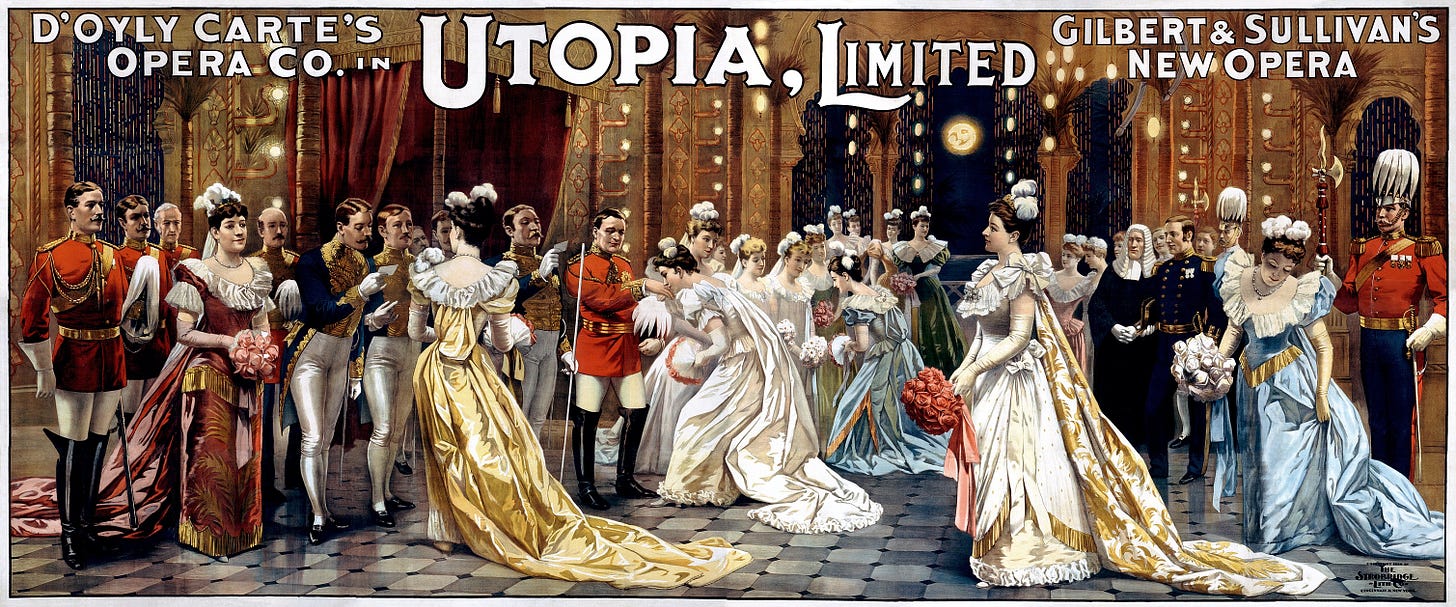Dystopic Utopia
The tensions in Earthly Perfection
I have been watching with fascination the recent exchange of posts on the question of utopia. I've seen a lot of very valid points made, and a lot of discussion is just over the definition of the word. But I have enough of a difference of opinion, or at least perspective, from both authors, that I think writing on the subject will be interesting.
I believe that at least as the word is traditionally used, but even in the way that Elle is attempting to use it, the concept of ‘utopia’ involves either heaven, a fantasy, or a dystopia.
Heaven
And I saw a new heaven and a new earth: for the first heaven and the first earth were passed away; and there was no more sea.
Revelation 21:1
Let me deal with heaven first. In heaven (the Christian heaven) you have an omniscient, omnipotent, omnibenevolent God who has arranged everything to his eternal satisfaction. The feature of humans entitled ‘sin’ been stripped away. There are no physical scarcities, there are no mental or even physical limitations.
Most writers of utopian fiction (or even utopian leaning non-fiction) don’t wish to go as far as ‘heaven’. They wish to have a sort of heaven on Earth, created by man. And man, naturally, lacks the characteristics of God, thus cannot actually produce anything resembling heaven.
The utopia they propose, then, still includes sickness and death (perhaps with excellent health care), sin and destruction, and is still contrasted with other places which aren’t at all utopias, or other times, before and after the utopia. Elle proposed both Sweden and The Shire as utopias, for example. Which brings up the spectre of The War of the Rings, the scouring of the Shire, World War II, and modern Sweden’s extreme gang problem.
Fantasy
Casting down imaginations, and every high thing that exalteth itself against the knowledge of God, and bringing into captivity every thought to the obedience of Christ;
II Corinthians 10:5
Now, let us move quickly through the idea of ‘fantasy’. The biggest problem in a utopian fantasy is that they are proposing a utopian system that would actually work. There are a dozen or so roadblocks to any utopia, and the designers of fantasy utopias invent magical or technological fixes for these. They might ignore physical limitations via magic or technology, they might ignore disease due to hyper-advanced medicine or healing spells, or they might ignore sin through omnipotent mind control but the end result is fantastical fiction, not an actual workable proposal.
But rarely does the fantasy utopia actually deal with all of them at once. Indeed, rare is the writer of utopian fantasy that even deals with or sees all of them. They deal with basic wants and pretend that that will mean the end of greed. And yet as long as everyone can’t have everything, there will be greed. And jealousy. All of the men might have beautiful wives, but they can’t all have all of the beautiful wives.
Dystopia
And they said one to another, Go to, let us make brick, and burn them throughly. And they had brick for stone, and slime had they for morter.
And they said, Go to, let us build us a city and a tower, whose top may reach unto heaven; and let us make us a name, lest we be scattered abroad upon the face of the whole earth.
Genesis 11:3-4
Now, let us turn to the more realistic utopias. Let us turn to a story which merely tries to solve one particular problem. Here, I would argue, is where they must, of necessity, begin their descent into a dystopia. Here, there is going to be something about a proposed solution which will throw up other, possibly worse, problems.
The most obvious problem that gets thrown up is that of coercion. It is not enough to build a better mouse trap; people must begin to use the mouse trap. And this will, at the very least, lead to declining sales for the other mouse trap manufacturers.
I am currently driving in an F150, not a horse and buggy. For my grandchildren, this is a utopia because I can get to see them much more often than if I had to use a horse and buggy. But for Greta Thornburg, it is a hell, because there are more CO2 and other noxious gases emitted from the tailpipe.
Now, let us turn things around. Suppose I was driving a wagon with four horses in front of it. Now Greta Thornburg is happy (except for the methane emission). And I think it would be kind of cool to be driving a wagon. But we would never get the 1000 miles to see our grandchildren, and I would no doubt get sunstroke. So for my poor grandchildren who live far away, this would be a dystopia.
Rare is the technological innovation which only does good, and rarest still a sociological invention.
Goals and ‘The Good’
Utopian writers frequently speak of a ‘better’ society. But that is not a neutral word, it is in no way a neutral word. It implies a universal standard of values. Which, outside of heaven, cannot exist.
This is the arresting and dominant fact about modern social discussion; that the quarrel is not merely about the difficulties, but about the aim. We agree about the evil; it is about the good that we should tear each other’s eyes out. We all admit that a lazy aristocracy is a bad thing. We should not by any means all admit that an active aristocracy would be a good thing. We all feel angry with an irreligious priesthood; but some of us would go mad with disgust at a really religious one. Everyone is indignant if our army is weak, including the people who would be even more indignant if it were strong. The social case is exactly the opposite of the medical case. We do not disagree, like doctors, about the precise nature of the illness, while agreeing about the nature of health. On the contrary, we all agree that England is unhealthy, but half of us would not look at her in what the other half would call blooming health. Public abuses are so prominent and pestilent that they sweep all generous people into a sort of fictitious unanimity. We forget that, while we agree about the abuses of things, we should differ very much about the uses of them. Mr. Cadbury and I would agree about the bad public house. It would be precisely in front of the good public-house that our painful personal fracas would occur.
I maintain, therefore, that the common sociological method is quite useless: that of first dissecting abject poverty or cataloguing prostitution. We all dislike abject poverty; but it might be another business if we began to discuss independent and dignified poverty. We all disapprove of prostitution; but we do not all approve of purity. The only way to discuss the social evil is to get at once to the social ideal. We can all see the national madness; but what is national sanity? I have called this book “What Is Wrong with the World?” and the upshot of the title can be easily and clearly stated. What is wrong is that we do not ask what is right.
GK Chesterton
The use of the word ‘good’ ignores the fact that one man’s good is another man’s evil. Suppose someone were to write a utopia in which even man was married to a happy, obedient, homemaking wife and had a houseful of happy, healthy, obedient children. Certainly, the vast majority of mankind (or at least men) all over the world and throughout all of history would see at least this part of the story as a utopia.
However, for many modern feminists and their fellow travellers, a society with obedient and fertile wives would be next door to hell. Not for them, the obedient wife or the household of children. And perhaps not even the marriage.
I have no idea what family structure modern feminists would consider heaven, but, at least for many men, feminist ideas have turned life on Earth into hell. A man marries a woman, gets here with a child or two, and then she divorces him. He ends up hardly seeing his children, having the pay alimony, having to pay child support, and not even getting to sleep with his wife!
And while the man sees the hell most directly, it is very clear that the current situation is bad for the women, and disastrous for the children!
Goals and Metrics
In evaluating any Society, there are two crucial factors. The first is, what are the goals that you are evaluating this society against? Is it self-reported happiness? Is it immigration or emigration? Is it fertility, marriage, or divorce? Number of young men getting PhDs or female CEOs?
And accompanying The goal must be metrics. If your goal is happiness, are you going to rely on Gallup polls? If your desire is for everyone to be married, is there a government registry? Some goals lead to easy and clear metrics. Others are much harder to determine.
And almost no one ever wants just one goal. You might wish for a society with a high marriage rate and a high fertility rate, but how do you combine them into one measure? Is that country where lots of people move into the country, and lots of people move out of the country more or less successful than the country where everyone is still living within 2 miles of where their grandmother grew up?
And who gets to decide? How would a Democrat feel living in a Republican utopia? If all of the home schools were incredibly successful, I imagine they would still be people who would yearn for the bells and whistles of government schools.
Modern Dystopia
As Chesterton said, we all may agree that we live, nowadays, in a dystopian society; but we would all fundamentally disagree on what utopia would be. Would it be a society where the men and women live separately and both produce a society that they think is ideal? I can guarantee you that for many (I would argue most) people that society could only stay in place with active force… so many people would wish, instead, to live together.
And what of the children?
So my conclusion is this: Outside of heaven or a fantasy world, one man’s heaven is another man’s hell. Or, to be specific, what one person or group of people would propose as ‘utopia’, would be opposed by other people as ‘dystopia’. And thus the only way to actually arrive at the utopia would be active force suppressing or killing large swaths of the population. Which would hardly seem to be anyone’s idea of ‘utopia’.









Can I write the obvious? "D'oh!"